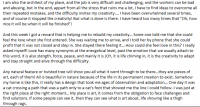Xisca
Member
Juxtaposition can be what I feel about it.... it is not a comparison, and it does not seem to go out of my mind but "soul" or heart. it comes to me, and I do not go to it. It just hits me.
"distant and true" rings a bell as well in what you say...
I have not read that much, so what I usually says is from myself, from personal experience. That's fun if Breton talked about something similar!
One example can be when I read about something scientific, and it juxtapose with traditional technique or believe, plus what I know about animal behavior. When 3 sources says the same, I just see it.
Sometimes I stay months and years with a surprise about soemthing I have learned, and one day I learn something that makes a flash, and the old question shows and it all fits!
"distant and true" rings a bell as well in what you say...
I have not read that much, so what I usually says is from myself, from personal experience. That's fun if Breton talked about something similar!
One example can be when I read about something scientific, and it juxtapose with traditional technique or believe, plus what I know about animal behavior. When 3 sources says the same, I just see it.
Sometimes I stay months and years with a surprise about soemthing I have learned, and one day I learn something that makes a flash, and the old question shows and it all fits!

